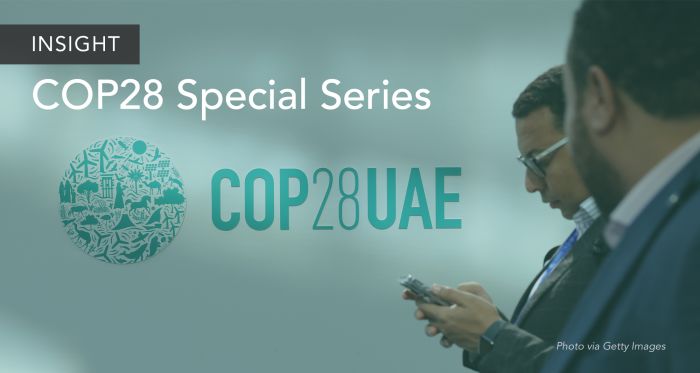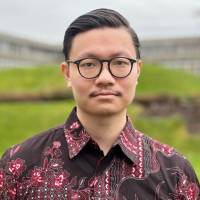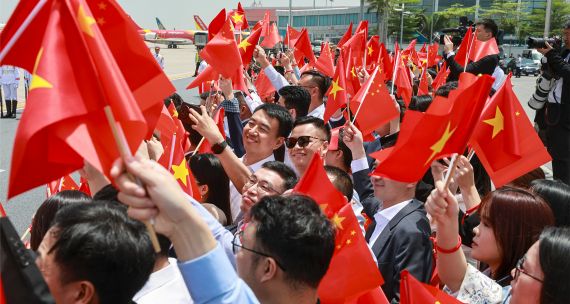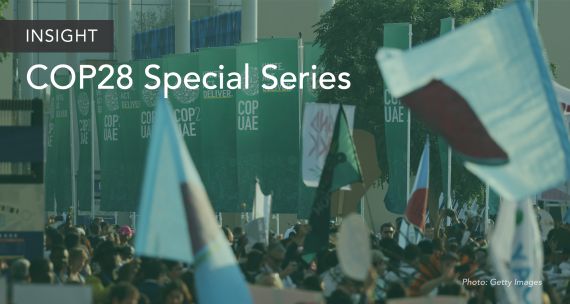The Takeaway
On December 13, in a historic move, 196 countries agreed to “transition away from fossil fuels in energy systems.” After a gruelling two weeks of negotiations, the 28th Conference of the Parties (COP28) to the UN Framework Convention on Climate Change (UNFCCC) agreed to the Global Stocktake (GST) Outcome, the culmination of the first review of the 2015 Paris Agreement. Governments across Asia, a rapidly developing region especially vulnerable to the impacts of a changing climate, played a crucial role during COP28, making multiple commitments beyond the GST.
In Brief
- The GST is a two-year process that takes place every five years. It takes an “inventory” of states’ efforts to meet their Paris Agreement obligations, the most fundamental obligation being “holding the increase in the global average temperature to well below 2 C above pre-industrial levels and pursuing efforts to limit the temperature increase to 1.5 C above pre-industrial levels.” The GST assesses how far states have come since adopting the Paris Agreement and how much further they have to go in terms of mitigation, adaptation, and implementation. Parties are to update their Nationally Determined Contributions (NDCs) by 2025, a process known as “ratcheting up.”
- The outcome of the first GST highlighted major limitations in the international response to preventing and addressing climate change. Notably, the GST found that NDCs were insufficient in delivering on the 1.5 C pathway required by the Paris Agreement.
- It took nearly 30 years for the COP to explicitly include “fossil fuels” in official texts. Despite falling short of calling for fossil fuels to be “phased out,” parties settled with “transitioning away.” The former is considered necessary to keep within the 1.5 C warming limit, while the latter does not require the total elimination of fossil fuels. The GST Outcome is a non-binding instrument that was weakly worded, partly due to the consensus-based decision-making structure under which the UNFCCC operates. Such instruments often deliver a ‘lowest common denominator’ pledge on which states can agree.
Implications
Gaps in mitigation, adaptation, and finance remain. The insufficient NDCs have resulted in a ‘mitigation gap’ — or the gap between the current trajectory and the 1.5 C pathway — of up to 45 per cent of annual global emissions. Most countries would have to aggressively cut their emissions, scale up renewables, and rapidly reduce deforestation to meet their Paris Agreement target. The GST also found that adaptation, crucial to addressing the impacts of climate change, was highly “fragmented, incremental, sector-specific, and unequally distributed.” The insufficient inclusion of local communities and transparency in delivering on this pledge was lacking. And despite the increased focus on climate finance, significant shortfalls persist. Climate finance still needs to be ‘de-risked,’ and accessibility to international funds must be simplified for progress to be made on this goal.
Asian states stepped up at COP28. Despite the shortcomings of the GST Outcome, states, particularly from Asia, made multiple pledges and commitments reiterating their commitment to stronger climate action. The Global Cooling Pledge signed by 61 countries, including Brunei, Cambodia, Singapore, Thailand, Vietnam, and Canada, aims to mitigate 68 per cent of emissions from cooling (e.g. refrigeration and air conditioning) by 2050 while the Global Renewables and Energy Efficiency Pledge — focusing on the tripling of global renewables capacity — was endorsed by Brunei, Malaysia, Singapore, and Thailand. Alongside these global commitments, on September 5 in a COP28 statement, Southeast Asian states highlighted the progress made towards the establishment of the ASEAN Centre for Climate Change in Brunei. The Centre will enhance regional climate collaboration while strengthening support for climate finance and clean technology development. Sri Lanka announced the Climate Justice Forum initiative on December 2, a platform dedicated to governments, businesses, and stakeholders to expedite climate financing in an equitable and just manner. The Climate Justice Alliance, a coalition of 30 non-state Bangladeshi organizations, pressed for an equitable green transition during COP28 while echoing developing nations’ demands for increased climate financing.
What’s Next
- Ratcheting up climate action by 2025 and COP29
The GST is meant to provide a course correction for aggregated global efforts in addressing the climate crisis. While serving as a stark reminder that the world is lagging in climate action, the GST may serve as a much-needed catalyst for stronger action. COP29 is set to take place in yet another oil state, Azerbaijan, and will be presided over by a former oil executive and Azerbaijan’s current ecology minister, Mukhtar Babayev. This arrangement is already attracting similar criticisms to those levelled at COP28 host United Arab Emirates.
2. Climate action in Asia, beyond the UNFCCC
While global climate action remains buttressed by the UNFCCC (despite criticisms of COP28), collaborative efforts across various systemic levels (e.g. government, business, academia, and civil society) are nonetheless required for effective solutions.
In 2022, Singapore state-owned Temasek launched GenZero, an investment platform funding nature and technology-based climate solutions. The C$5-billion platform has invested in various climate initiatives across Asia, including the deployment of sustainable aviation fuel and acceleration of early-retirement coal plants across Southeast Asia. Canadian organizations such as the Toronto Centre, meanwhile, are arming Asian stakeholders with decision-making tools aimed at de-risking climate investments in the region, providing capacity-building programs and risk analysis classes that enable stakeholders to make sustainable and inclusive climate investments.
• Produced by APF Canada's Southeast Asia team: Hema Nadarajah (Program Manager), Sasha Lee (Analyst), and Alberto Iskandar (Analyst). Editor: Ted Fraser. Design: Chloe Fenemore. Translation: Eva Moreta







